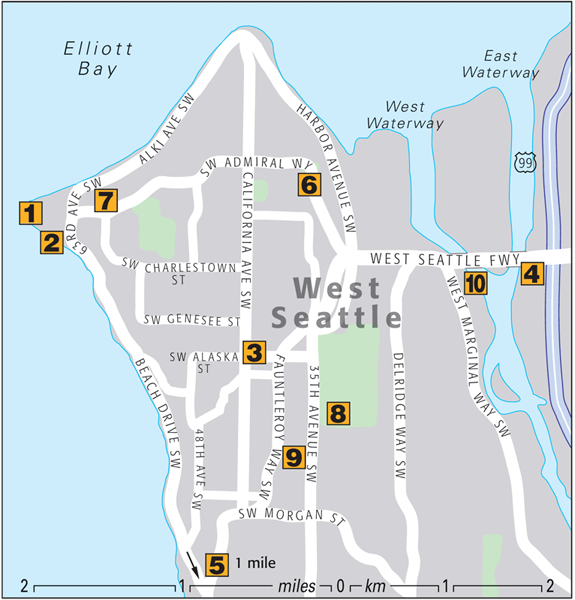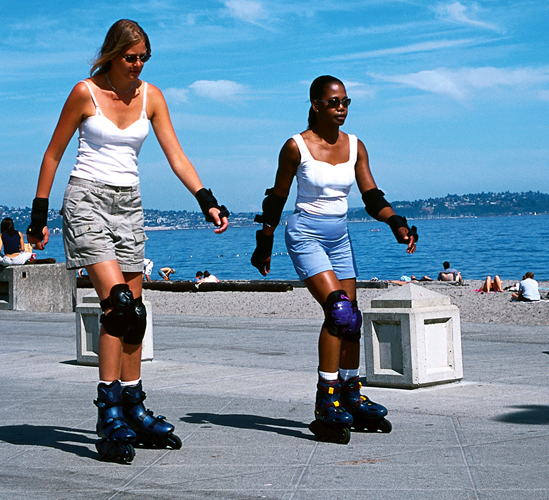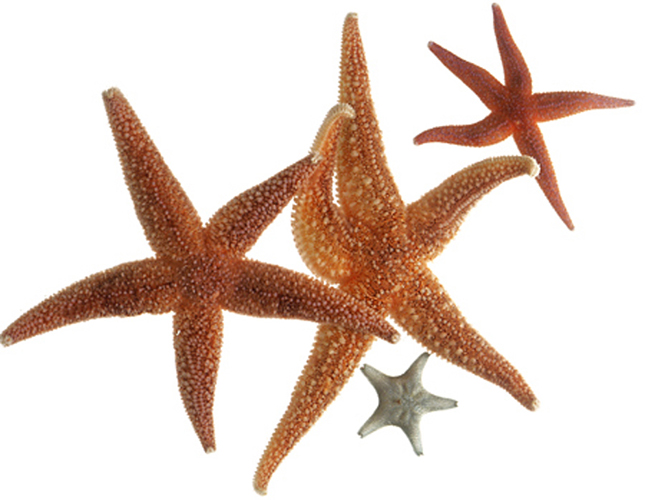A stretch of Elliott Bay
separates central Seattle from the peninsula of West Seattle, the city’s
oldest and largest district. Connected by a high freeway bridge and a
lower span, West Seattle’s proximity to both downtown and the Industrial
District has always made it a popular residential area. More than
53,000 people reside here, for since the 1990s dot.com boom West Seattle
has attracted an entirely new population of younger, entrepreneurial
residents drawn by lower housing costs, the strong sense of community,
and some of the best parklands in the city. Alki Beach and its paved
waterfront trail bring hordes of revelers when the long, damp winter
months give way to sunnier spring days.
|
Before white settlers
landed in what would become Seattle, the Duwamish River zigzagged
throughout the valley between the hillsides of West Seattle and Beacon
Hill to the east. The area was in many ways more wetland than river
until the Army Corps of Engineers dredged it in the late 19th century,
deepening the bed and making the Duwamish permanently navigable by
commercial vessels. The dredge filled in tideflats to create Harbor
Island, which lies between two small channels where the Duwamish pours
into Elliott Bay. Many of the port’s container yards and maritime
industries use this advantageous depot acreage south of downtown.
|

|
Some of the best views of mountains, water, and the city skyline originate from the hilltops in West Seattle.
|
|
|
Choose your activity based on weather conditions. If it’s sunny and warm, head to Alki Beach or take a ferry ride.
|
|
|
Parking is extremely hard to find at Alki in summer. Consider taking a bus, biking, or walking from a short distance away.
|
|
SightsAlki Point Seattle pioneer Arthur A. Denny and his party aboard the ship Exact were the first Europeans to settle the region; they chose the beachhead of West Seattle to come ashore in 1851. Duwamish Tribe Chief Sealth
met the group with open arms and began a long friendship with Seattle’s
founders. Today, Alki Point boasts row after row of upscale waterfront
condos for the well-to-do, and a great beach for shell hunting or scuba
diving.

Rollerbladers along Alki Beach
Constellation Beach Seattle
beachcombers check for the year’s lowest tides and head to one of the
best shoreline secrets, Constellation Beach. It’s not the best
recreational shore as it lacks a wide sandy stretch but gets its name
from the large numbers of sea stars clinging to the rocky intertidal
zone. If the conditions are right, it’s not rare to find scores of
colorful sea stars, along with the usual anemones, gargantuan sea
snails, and geoducks, Puget Sound’s giant clams.

Sea stars
The Junction The
Junction is the epicenter of what used to be an autonomous village in
its own right. The name refers to the intersection where California
Avenue and Alaska Street meet, and it is here that the bulk of West
Seattle’s restaurants and shops are located. The small town feel is
palpable as you stroll along California Avenue past mom ‘n’ pop shops
and notice old-timers out for walks or sipping coffee at sidewalk
tables. Murals painted on the sides of businesses mirror the warmth and
pride of a tightly knit community in its prime, and reflect on its
150-year-old history. Illustrations include the original streetcar lines
from 1918. West Seattle Bridge From
downtown, the fastest way to anywhere in West Seattle is via this
highway, built in 1984. The bridge takes traffic from I-5 and other
feeder streets over man-made Harbor Island and the mouth of the Duwamish
River, and through to all the major streets in West Seattle. It’s
visible from many vantage points in town. Fauntleroy Ferry Terminal There’s
only one ferry from Seattle that gets you to pastoral Vashon Island,
and that’s the Fauntleroy Ferry with its terminal at the end of
Fauntleroy Way. Unlike the downtown terminal, this one is in a
residential neighborhood, adjacent to scenic Lincoln Park.
Allow some time to walk along the water’s edge to watch ferries come
and go. For a memorable visit to Vashon, bring a bike, and look into
u-pick berry patches in summer months. Belvedere Park Viewpoint For
a bird’s-eye view of the city of Seattle and its immediate environment,
simply drive or take a bus up Admiral Way to tiny Belvedere Park. Take
in 180-degree picture postcard views of the Cascade Range behind the
high-rises of downtown, industrial Harbor Island and the Port of
Seattle’s container yards, and Elliott Bay and Puget Sound. On clear
days, distant and permanently snow-capped Mount Baker on the
northeastern horizon looms above all else. If you’re in downtown, a
20-minute bus ride to Alki Beach drops you nearby on Olga Street SW. Log House Museum The museum, near Alki Beach, takes local history seriously, as it marks the location where Captain Folger steered his schooner Exact
in 1851, and brought to the region the families of Seattle’s earliest
pioneers, the Arthur A. Denny party. The Log House Museum lets you
rediscover the history of the Duwamish Peninsula with an orientation
center and exhibits that preserve the community’s legacy, speaker
programs, and special events. 3003 61st Avenue SW 206 938 5293 Open on Thu noon–6pm, and weekends noon– 3pm Suggested donation: $2 (adult), $1 (child)
www.loghousemuseum.org
Camp Long In
an entirely urban locale, Camp Long comes close to imparting the wild
and natural experience usually found only during hikes in local mountain
ranges. Once the 1941era camp served only scouting organizations, but
in 1984, the 68 acre compound opened to the general public. Inside the
grounds, visitors can hike trails, learn about the environment from
professional naturalists, or even rent rustic cabins for in-city
camping. One of the most popular attractions is the 20-ft (6-m) high
Schurman climbing rock, carefully designed to incorporate every climbing
maneuver. Bats, Opossum, raccoons, chipmunks, and northern flying
squirrels have been sighted in the camp. Weekly interpretive walks, rock
climbing classes, and a golf course are also available. Walker Rock Garden Boeing
worker Milton Walker failed in his task to create an ornamental
concrete lake in his yard between 1959 and 1980. Never one to give up,
he re-doubled his efforts to create an artistic vision that’s outlived
the builder. Walker devoted much of his time to sculpting towers,
mini-mountains, and trails using countless sea shells, crystals,
Brazilian agate, and colored glass. Today, the work remains on the
private property still owned by his family. Steel Mill Seattle’s
remaining steel mill and the city’s largest user of electrical power
hunkers down on the Duwamish River’s western shore. The mill processes
recycled scrap from cans, cars, and construction materials just across
the river from an upscale yacht marina and office park, embodying
Seattle’s ethic of mixed-use waterfront. While some may consider the
plant an eyesore and major polluter, it competes successfully with Asian
firms and provides jobs for the local economy.
|